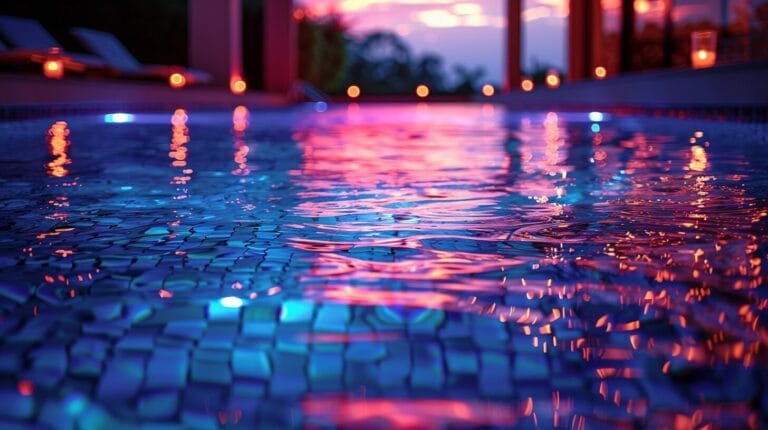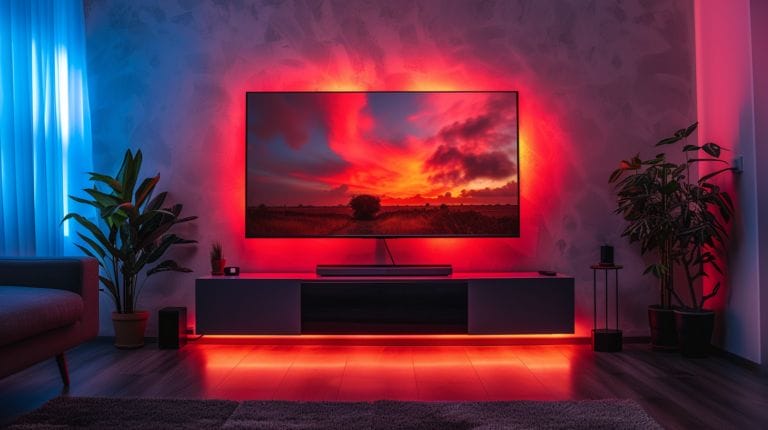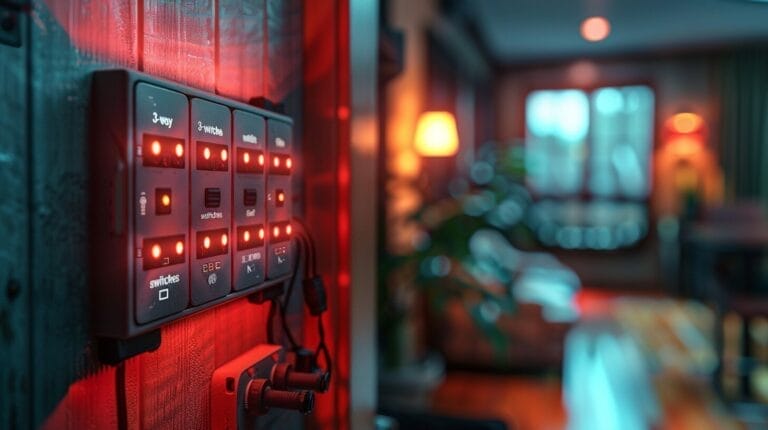Fish Light at Night: The Importance of Aquarium Lighting
Have you ever pondered the significance of light in an aquarium setting?
As we explore the depths of this topic, we uncover the pivotal role that aquarium lighting plays in the well-being of our aquatic companions.
From mimicking natural light cycles to providing a sense of security, the impact of fish light at night goes beyond mere aesthetics, also highlighting what you need to know about aquarium maintenance.
In our Fish Light at Night guide we will nravel the mysteries surrounding the importance of aquarium lighting and its implications for the underwater world.
Key Takeaways
- Nighttime lighting is crucial for fish rest and well-being.
- Regulating light cycles mimics natural day/night patterns.
- Excessive light at night can stress fish and disrupt their rhythms.
- Use dim, soothing lights or moonlight simulation for optimal fish health.
Understanding the Role of Light in Aquariums

In our exploration of aquarium lighting, we examine the critical role that light plays in the underwater world of fish. Light is a vital factor in regulating the biological rhythms of fish, influencing their behavior and overall well-being, underlining the fact that both fish and live plants in your aquarium need 10 hours of light cycles. Fish, just like us, have internal clocks that follow a day and night cycle. The hours of light in their environment significantly impact their activity levels, feeding patterns, and breeding behaviors.
When we turn on the light in an aquarium, we signal to the fish that it’s daytime. This prompts them to become more active, search for food, and engage in social interactions. Conversely, when we turn off the light, mimicking nighttime, fish tend to become calmer, reduce their movement, and prepare for rest. This light/dark cycle is essential for maintaining the natural biological rhythms of fish, ensuring they experience periods of activity and rest similar to those in their natural habitats.
Do Fish Need Light at Night in an Aquarium?

Contrary to common belief, fish don’t require light at night for their well-being, which is an important aspect to consider in ensuring your fish get enough rest. While it might seem natural to provide continuous light, it’s essential to understand that fish, like any other living being, need darkness to rest properly.
Exposure to light at night can disrupt a fish’s internal clock, leading to stress and potential health issues, underscoring the importance of knowing how much light your fish get. Constant light exposure can interfere with their natural behavior, making them disoriented, lethargic, and more susceptible to diseases.
Hence, providing a period of darkness in the aquarium to mimic their natural habitat accurately is critical. It’s during these dark hours under a dim tank light that fish can rest, regulate their metabolism, and reduce stress levels, making the importance of having controlled light cycles clear. A well-balanced light cycle that includes periods of darkness is key to promoting the overall well-being of fish in an aquarium.
How to Set Up Aquarium Light for Nighttime

When setting up aquarium lighting for nighttime, consider the importance of choosing the right type of light to guarantee the best conditions for your fish. Aquarium lights designed specifically for nighttime use often include features like moonlight simulation or nocturnal lighting settings. These options help replicate natural lighting conditions that can benefit your fish’s well-being.
To set up your aquarium light for nighttime, start by adjusting the light levels to create a dim and soothing environment, a vital step to make your fish and plants thrive in harmony. Exposing your fish to bright lights during the night can disrupt their natural rhythms and cause stress. By using dimmer settings or specialized nocturnal lighting, you can provide a more comfortable atmosphere for your fish to rest and relax, showcasing how to make your fish feel safe without light.
Time your tank lights to turn on and off consistently, mimicking the natural cycle of day and night, ensuring that plants receive approximately 12 hours of light. This consistency can help regulate your fish’s behavior and keep them healthy.
Can Light at Night Cause Stress in Fish?

Light exposure at night, especially if it’s too much light, can indeed cause stress in fish, impacting their well-being and behavior in aquariums; hence, keep the light in moderation. Fish, like many other animals, have natural day and night cycles that can be disrupted by artificial lighting. Signs that your fish may be experiencing light-induced stress include increased aggression, restlessness, or decreased appetite.
To reduce light-related stress in your aquarium, consider implementing a timer to regulate the duration and intensity of light. Mimicking natural lighting conditions by gradually dimming the lights in the evening can help signal to the fish that it’s time to rest. Providing adequate hiding spots or shelter within the aquarium allows fish to retreat to dimly lit areas if they feel overwhelmed by the brightness.
Observing your fish for any signs of stress and adjusting the lighting schedule accordingly can help maintain a healthy environment in your aquarium.
Can Aquarium Lighting be used as Grow Lights for Indoor Plants and Vegetables?
Yes, aquarium lighting can double as some of the best grow lights for indoor plants. LEDs are energy-efficient and provide the necessary light spectrum for healthy plant growth. However, it’s crucial to consider the specific needs of each plant species before using aquarium lighting as grow lights for indoor plants.
Maintaining Your Aquarium Light and Fish Tank for Optimal Health

Regular maintenance of your fish tank light and aquarium is key to ensuring peak health for both your aquatic plants, which need specific light for photosynthesis, and tropical fish. The amount of light your aquarium receives directly impacts the growth of your plants through photosynthesis and ensures enough oxygen is produced for tropical fish, emphasizing that plants need light to grow.
Fish and plants have their own natural circadian rhythms, which can be disrupted if the lighting in the tank is inconsistent or inadequate, signifying that both need the light for their health. Regularly check that your fish tank lights are functioning correctly and provide the right spectrum and intensity for your aquatic inhabitants, keeping in mind that too much light can affect the oxygen levels adversely. Clean the light fixtures and remove any algae buildup, as excessive algae growth can block light from reaching your plants and create an unbalanced ecosystem.
By using a timer to mimic natural day and night cycles, you can ensure your fish and plants receive the appropriate amount of light each day.
Conclusion
To sum up, aquarium lighting plays a vital role in the health and well-being of fish. Providing the right amount of light, even at night, is essential for their natural behaviors and overall happiness.
By setting up and maintaining proper lighting in your aquarium, you can guarantee that your fish thrive in their environment. Remember, a well-lit tank is a happy tank!
Frequently Asked Questions
Why is aquarium lighting important at night?
Aquarium light at night, especially a soft blue light, is crucial for maintaining the health and well-being of your tropical fish and ensuring plants get the much-needed light without stressing the inhabitants. It helps simulate the natural day-night cycle and provides essential light for plant growth.
How many hours of light should I provide for my aquarium?
Generally, it is recommended to provide 10-12 hours of light per day for your aquarium. This duration, typically around 12 hours of light and 12 hours of darkness, mimics a natural day cycle and is beneficial for the plants and tropical fish in your aquarium.
What type of light is best for a fish tank?
Different types of fish and plants may have different light requirements. Typically, LED lights are popular for aquariums as they are energy-efficient and come in various colors suitable for plant growth and fish health.
Do freshwater fish need light at night?
Freshwater fish benefit from a period of darkness to rest at night. However, providing a night light in the aquarium can help replicate the moonlight effect and create a more natural environment for the fish.
How does the presence of light affect fish health?
Light plays a crucial role in fish health by promoting their natural behaviors, regulating their circadian rhythms, and supporting plant growth, which in turn contributes to a healthy and balanced aquarium ecosystem.







